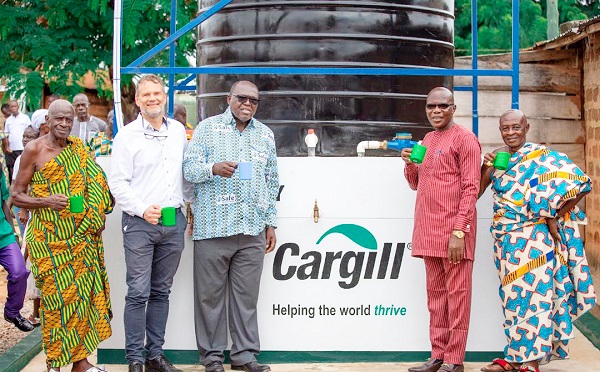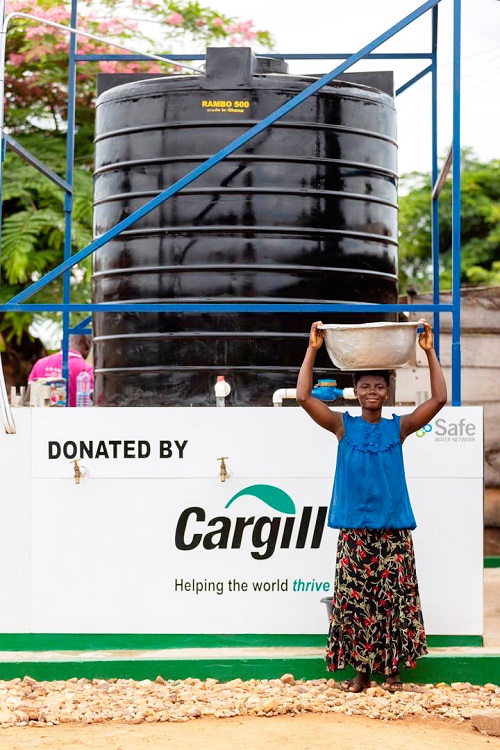
Cargill expands sustainable safe water access to Western North Region
AFAMU, Western North Region (April 28, 2022)
Over 10 mechanised solar-powered water systems have been constructed and handed over in 10 cocoa-growing communities in the Western North Region.
The beneficiary communities are Afamu, Nambro, Abrabra, Asafo and Kantankrobo. The rest are Baakokrom, Surano, Ntrentenso, Punikrom and Kramokrom in the Bibiani-Anwiaso-Bekwai and Sefwi Wiawso municipalities.
The project is aimed at ensuring access to Water, Sanitation and Health (WASH) services in deprived cocoa communities and was funded by Cargill. It is expected that about 15,000 people will be directly and indirectly impacted through this project.
At a brief commissioning event held at Afamu in the Western North Region on the theme “Expanding Sustainable Access to Water, Sanitation and Hygiene (WASH) for Cocoa Growing Communities” Cargill Ghana Limited, together with its technical pa
“I want to thank Cargill for being a true partner to the communities in this area. As a grateful people, I can assure you that we will stick with you as our preferred cocoa partner” he remarked. Expanding access to water to rural communities is key to government’s agenda to improve livelihoods especially for cocoa-growing communities. This was iterated by a speech read on behalf of the Western North Regional Minister, Hon. Richard Ebbah Obeng, by the A spokesman for the Western North Region, Hon. John Koah. He commended Cargill’s sustainability initiative and underscored the importance of potable water to the lives of Ghanaians living in rural communities. “The United Nations Development Goal 6 of providing safe and affordable water for all by the year 2030 cannot be achieved by the government alone. It is in the light of this that I want to commend highly Cargill Ghana Ltd for supporting communities with safe and affordable water to augment government’s effort” he said. The beneficiary communities, who have been part of Cargill's sourcing network and the Cargill Cocoa Promise since 2017, were selected based on a Community Action Plan (CAP) development and a needs assessment in collaboration with CARE International. Sustainability Country Lead for Cargill Ghana, Samuel Apana, said the project forms part of the company’s Community Wellbeing Strategic Action Plan linked to the United Nations' Sustainable Development Goal (SDG) 6 of providing safe and affordable water for all by 2030. The project, he also said, is in line with delivering benefits under the Cargill Cocoa Promise, which is the company’s sustainability strategy. “The commissioning of the water-projects today not only demonstrates our commitment under the Cargill Cocoa Promise to improve the wellbeing of farmers and their communities, but also our resolve to partner with customers who have established water goals as part of their sustainability strategies to realize their ambitions” Mr Apana said. The mechanized solar powered water system Management and operation of these water systems is community-led. The solar water systems will be owned by the local Assemblies in the area and will be operated and maintained by community Water & Sanitation Management Teams (WMSTs) and Operators, who have been trained as part of this project. These teams will be responsible for the installed water systems and will be carrying out maintenance and repair works, if need be, with proceeds from the sale of water from the system. As part of Cargill’s global water commitments, the company works in partnership with the Global Water Challenge (GWC) on implementing new water, sanitation and hygiene (WASH) efforts in Ghana, Cameroun, and Côte d’Ivoire. These initiatives are expected to benefit over 100,000 people in 26 high-need communities across four of Cargill’s priority watersheds. About Safe Water Network Gh. To date, Safe Water Network Gh. has implemented [500] small water enterprises in Ghana and India, providing access to safe, reliable, affordable water to over 1.6 million underserved consumers beyond the reach of piped water networks. It has spearheaded the design and implementation of small water enterprises, applying private-sector principles to expand and strengthen water supply in peri-urban, small town, and large rural communities. Using its extensive field experience to date, it has developed a standardized implementation methodology, digital tools and monitoring systems, and sustainability standards to support the efficient launch and management of small-scale water systems. Since 2009, Safe Water Network Gh. has implemented an integrated program to build the national SWE sector in Ghana. Across 133 communities, SWN's 93 micro-utilities provide access to access to safe, reliable, affordable water to over 420,000 consumers in Ghana. About Cargill Ghana Limited Cargill's 155,000 employees across 70 countries work relentlessly to achieve its purpose of nourishing the world in a safe, responsible and sustainable way. Every day, it connects farmers with markets, customers with ingredients, and people and animals with the food they need to thrive. It combines 155 years of experience with new technologies and insights to serve as a trusted partner for food, agriculture, financial and industrial customers in more than 125 countries. Side-by-side, Cargill is building a stronger, sustainable future for agriculture. For more information, visit Cargill.com and its News Center.
